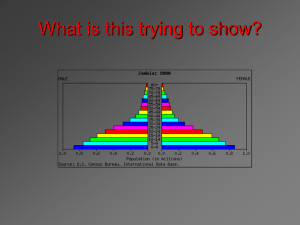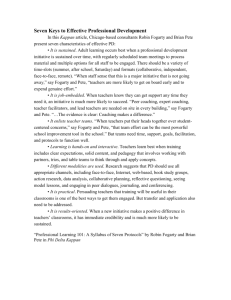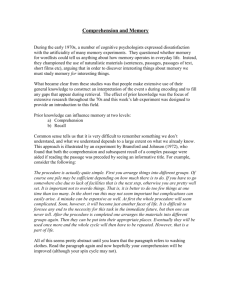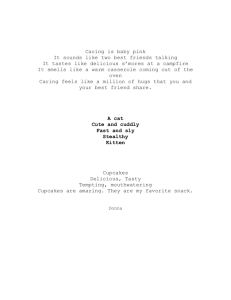Word - University of St Andrews
advertisement
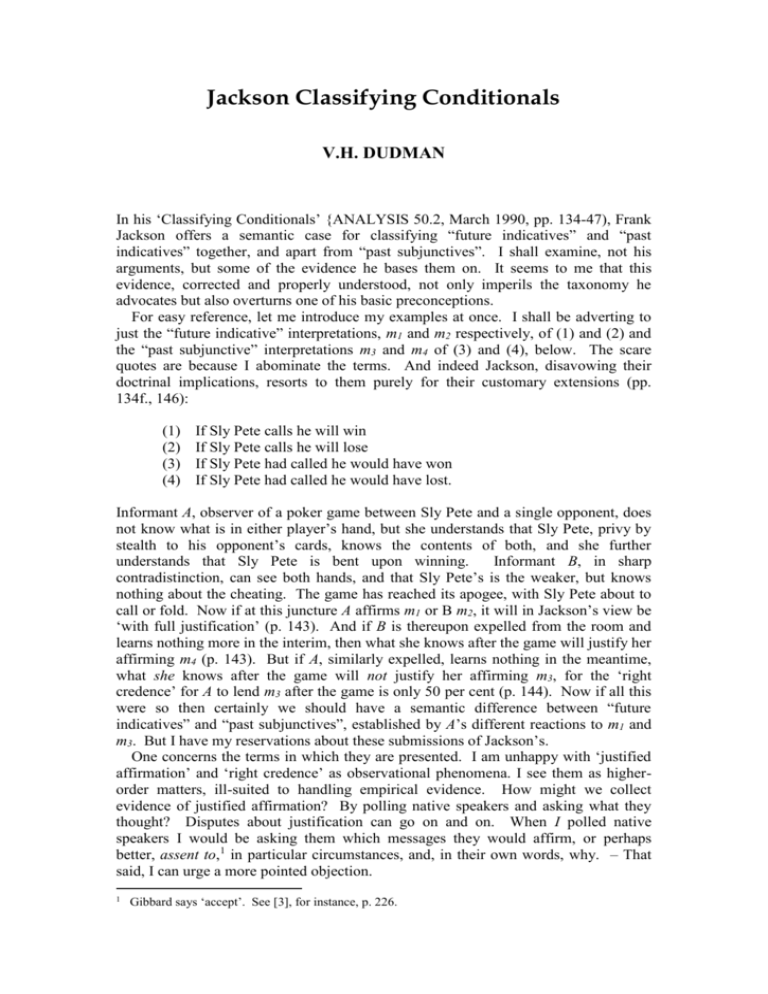
Jackson Classifying Conditionals
V.H. DUDMAN
In his ‘Classifying Conditionals’ {ANALYSIS 50.2, March 1990, pp. 134-47), Frank
Jackson offers a semantic case for classifying “future indicatives” and “past
indicatives” together, and apart from “past subjunctives”. I shall examine, not his
arguments, but some of the evidence he bases them on. It seems to me that this
evidence, corrected and properly understood, not only imperils the taxonomy he
advocates but also overturns one of his basic preconceptions.
For easy reference, let me introduce my examples at once. I shall be adverting to
just the “future indicative” interpretations, m1 and m2 respectively, of (1) and (2) and
the “past subjunctive” interpretations m3 and m4 of (3) and (4), below. The scare
quotes are because I abominate the terms. And indeed Jackson, disavowing their
doctrinal implications, resorts to them purely for their customary extensions (pp.
134f., 146):
(1)
(2)
(3)
(4)
If Sly Pete calls he will win
If Sly Pete calls he will lose
If Sly Pete had called he would have won
If Sly Pete had called he would have lost.
Informant A, observer of a poker game between Sly Pete and a single opponent, does
not know what is in either player’s hand, but she understands that Sly Pete, privy by
stealth to his opponent’s cards, knows the contents of both, and she further
understands that Sly Pete is bent upon winning.
Informant B, in sharp
contradistinction, can see both hands, and that Sly Pete’s is the weaker, but knows
nothing about the cheating. The game has reached its apogee, with Sly Pete about to
call or fold. Now if at this juncture A affirms m1 or B m2, it will in Jackson’s view be
‘with full justification’ (p. 143). And if B is thereupon expelled from the room and
learns nothing more in the interim, then what she knows after the game will justify her
affirming m4 (p. 143). But if A, similarly expelled, learns nothing in the meantime,
what she knows after the game will not justify her affirming m3, for the ‘right
credence’ for A to lend m3 after the game is only 50 per cent (p. 144). Now if all this
were so then certainly we should have a semantic difference between “future
indicatives” and “past subjunctives”, established by A’s different reactions to m1 and
m3. But I have my reservations about these submissions of Jackson’s.
One concerns the terms in which they are presented. I am unhappy with ‘justified
affirmation’ and ‘right credence’ as observational phenomena. I see them as higherorder matters, ill-suited to handling empirical evidence. How might we collect
evidence of justified affirmation? By polling native speakers and asking what they
thought? Disputes about justification can go on and on. When I polled native
speakers I would be asking them which messages they would affirm, or perhaps
better, assent to,1 in particular circumstances, and, in their own words, why. – That
said, I can urge a more pointed objection.
1
Gibbard says ‘accept’. See [3], for instance, p. 226.
Allan Gibbard, whose creature Sly Pete is, conducted ‘informal polls’ and found that,
while most respondents thought that in A’s place they would assent to m1, some
demurred ([3], p. 228). Now if this result is correct then one of Jackson’s
fundamental preconceptions is mistaken. He wants the speaker’s present information
to be the arbiter of (justified) assent to a conditional. But Gibbard gets assent to vary
while keeping speaker information constant. It is therefore dangerous for Jackson to
dismiss Gibbard’s result as a ‘complication’ (p. 143n), especially when this means
presuming without evidence that Gibbard’s dissidents either understand English
imperfectly or are confused in their thinking. I favour the more timorous course of
saving Gibbard’s result, and accordingly seek a theory of conditionals which explains
how m1 can elicit diverse reactions from A. In feeling towards it I shall be guided by
the pious hope that, when Gibbard’s informants assent or dissent to or from a
conditional, they do so for rational, intelligible reasons.
Jackson says B would be fully justified in affirming m2, and certainly it would be a
rare B who did not assent to it. Evidently the underlying reasoning is along these
lines:
Sly Pete holds a losing hand. So if he calls it will be with a losing hand: if he
calls he will lose.
It will be observed that this reasoning exacts a conclusion about the future from a
premiss about the present. Evidently B expects the present contents of the hands to
persist unchanged into the future, so that when Sly Pete calls, he still holds the worse
hand. A safe bet, certainly; but a necessary presumption nonetheless.
The same B who assents to m2 before the event assents to m4 after it. Jackson says
m4 is ‘supported by the information that warrants the assertion of’ (2) under m2 (p.
143). Same underlying reasoning, too, I suppose.
Sly Pete held a losing hand, so if he had called it would have been with a
losing hand.
And reliant on the same expectation, if I may still so call it: that the players’ hands
remain unchanged from the time of B’s expulsion from the room until the time for Sly
Pete to call or fold.
As Gibbard discovered, A may or may not assent to m1 before the event. If she
does, the underlying reasoning must be as follows:
(X)
Sly Pete is out to win and knows whose hand is better, so if he does not
hold a winning hand at the moment of decision, he will refrain from
calling. Therefore if he calls it will be with a winning hand; if he calls
he will win.2
Again a future conclusion is got from present premisses. And the basic means is
the same as before: a present state of affairs is expected to persist into the future. But
the present state of affairs this time is Sly Pete’s illicit knowledge. (Together with his
will to win, which I shall henceforth ignore for brevity.) We can remark in passing
It must not be thought that the move from ‘If he does not hold a winning hand he will not call’ to If
he calls he will hold a winning hand’ is straightforwardly deductive, cognate with that from ‘If Socrates
is not mortal he is not a man’ to ‘If Socrates is a man he is mortal’. For it makes perfect sense to say
‘Sly Pete will not call without a winning hand. If he does he will lose his shirt’.
2
that this reasoning is more complicated than B’s. Less usual, too, concerned with how
the if-condition comes to be satisfied. Compare p. 165 of [1].
The dissident A’s who withhold their assent from m1 are evidently moved by some
such reasoning as this:
Sly Pete may for all I know hold the weaker hand. If Sly Pete calls while
holding the weaker hand he will lose. So for all I know Sly Pete may not win
if he calls.
Once more a future conclusion is got from present premisses. And by the same
device: some present state of affairs is expected to persist unchanged into the future,
up until at least the time of the if-condition’s satisfaction. In this case it is the hands
the players presently hold, just as it was when B assented to m2. They will be hands
unknown to A that the players hold when Sly Pete calls or folds, but they will be the
same unknown hands as they hold now. It is implicit in the reasoning that Sly Pete is
to call or fold with the hand he holds now. The 50 per cent chance A assigns to his
winning if he calls is the 50 per cent chance she assigns to his holding the better hand
now.
Incidentally, we can be confident both that A expects Sly Pete’s illicit knowledge to
persist and that she expects the hands to remain unchanged. But her reaction to m1
will use just one of these expectations for bridging the temporal gap between
premisses and conclusion. Which of the two depends on how she is arguing.
Ramsey’s idea of referring messages like m1 to someone’s ‘stock of beliefs’ is too
crude. A’s reaction to m1 depends on how she is arguing, and premisses can be found
among her stock of beliefs for arguments of opposite tendency. The question is not
what is in the stock, but what particular use particular elements of the stock are put to
in the course of some particular exercise of reasoning.
m3 provides A with exactly the options after the event that she enjoyed before it
from m1.3 She can consider how the if-condition came to be satisfied, rely on
preserving Sly Pete’s illicit knowledge, and assent to m3. Or she can consider
developments when the if-condition came to be satisfied, rely on preserving the hands,
and withdraw her assent.
Jackson won’t have this. He insists on keeping the hands. When he concludes that
m1 rates a credence in A of only 50 per cent, it is because he is using sameness of
hands to bridge the gap between the time of A’s expulsion and that of Sly Pete’s call.
His actual argument invokes a ‘right or best thing for Sly Pete to do’, which turns out
to be dependent exactly on the hands:
What A can be sure about though is that Sly Pete will do the right, in the sense
of the most rewarding, thing. That is his return for cheating. But what is the
right thing for Sly Pete to do? The answer depends on whether or not he has
the stronger hand. (pp. 143f).
It seems to me we might equally argue
A can be sure that Sly Pete would have done the right thing. Therefore she
can be sure he wouldn’t call without a winning hand. Etc.
I am more confident than ever or this after the discussion of Jackson’s paper at the Analysis 50
Conference. I think particularly of Simon Blkackburn’s reaction.
3
But the ‘most rewarding thing’ idea is overdrawn anyway: If A accords m3 a 50 per
cent credence after the event it is simply because she is preserving the hands while
having no idea whose was better. My real criticism is that Jackson has arbitrarily
excluded a genuine alternative.
Why must A use the hands? If we asked Sly Pete afterwards why he folded he
would undoubtedly use the hands, just as B did in reaction to m4, saying ‘If I had
called I would have lost’. But of course: Sly Pete chose whether to call by foreseeing
consequences of his calling, not by considering how he might have come to call. But
that has no tendency to disqualify the other line of argument for A, or even for Sly
Pete himself in another vein. Nor has the reflection that time has marched on and left
the players’ actual hands fixed forever. The march of time has left everything in the
past fixed, Sly Pete’s illicit knowledge no less than the players’ hands.
No doubt the presumption that A has only one “justified” reaction to m3 discourages
recognition of rival lines or argument. But it means Jackson has to find fault when A
reasons after the event as follows, and I cannot think where a fault might lie:
(Y)
Sly Pete knew whose hand was better at the time of my ejection; so if
he had not held a winning hand at his moment of decision he wouldn’t
have refrained from calling. Therefore if he had called it would have
been with a winning hand.
The onus here is with Jackson. A natural response to arguments (X) and (Y) is that
the reasoning is the same, the purely formal differences between the two passages
there solely to allow for a difference of time. Indeed this proposal can be made very
exact. Perhaps ‘calls’ and ‘will win’ in (1) register presentness because m1’s
underlying reasoning starts from how things are now, while ‘had called’ and ‘would
have won’ in (3) register pastpastness because m3’s underlying reasoning starts from
how things were at a point past with respect to the already past call.
My charge, at all events, is that Jackson achieves his discrepant data about m1 and
m3 arbitrarily. At the outset he excludes a whole dimension by permitting only one
“justified” reaction to m1 or m3. This means cutting down on cases. But he cuts down
on cases by depriving m1 of one line of argument and m3 of the other. Whence the
semantic distinction he thinks to see between “future indicatives” and “past
subjunctives”.
A’s reaction to m1 or m3 will depend, as I have said, on her underlying argument.4
Here two points. First, the choice of how to argue is simply free. There can be no
right or wrong about it: the entire enterprise is a creative act. A will use the hands or
the cheating in accordance with her broad purposes. Secondly, the argument is bound
to be tacit From the nature of the case, A can never say in her ‘if’-sentence how the
temporal gap is to be bridged between premisses and conclusion in her underlying
argument. She can make expectations explicit, certainly, and imagine them fulfilled:
. . . if the hands remain unchanged from now until then . . .
But which way she will argue remains as enigmatic as before. If someone says
If Sly Pete calls with the hands as they are now, he will win
4
In [1] I describe a conditional receiving the same reaction, namely assent, on the basis of four
different arguments: see sections 27-29. Better to have shown different reactions, such as A’s to m1 or
m3.
for example, A will dissent or not depending as she uses the hands or the cheating.
(To B, meanwhile, the natural interpretation of ‘If Sly Pete calls with the hands as
they are now he will lose’ has the ring of an inescapable truth. But only because she
is using the hands, and that only because she can think of nothing else to use. In real
life there would be more for her to conjure with.)
Let us go back to before the expulsion. All of a sudden, with A in the middle of
affirming m1 ‘with full justification’, Sly Pete is shot dead before her very eyes. As a
matter of observation, she meets this crisis by saying (3) instead of (1). And
presumably with the same full justification. At this stage the calling and winning are
still future; but if she reiterates (3) periodically she will eventually assert it with the
imagined all and win indisputably past. And still with the same justification. Now, is
the message thus recurrently affirmed our familiar m3? In my design, certainly; what
Jackson calls “past subjunctives” need not be about the past. But Jackson can expect
trouble whichever way he answers.
After the shooting, (3) provides A with means of making the same point she was
formerly making with (1). If she tried to go on making it with (1) she would find
herself now talking about a deceased Sly Pete calling and winning, something remote
from her original plan. By switching to (3), A evidently retreats to a time before Sly
Pete’s assassination, a time when Sly Pete was actually still alive, so that she can then
imagine him staying alive right into the future, ready for a live Sly Pete to call.5 It is
thus that she is able to resume her original point, which concerned a live Sly Pete
calling. As before, then, we find m1 arrived at on the basis of how things are now and
m3 on the basis of how they were in the past past, but both by the same line of
argument.
So when A is reacting to m1 or m3, apparently all that is betokened by the formal
differences between (1) and (3) is a difference in the temporal location of the facts
that her underlying reasoning goes to work on. But if m1 and m3 are as like as that
then they ought to be classified together, not apart. – Which brings me back to the
first of the two things I promised at the start. Time to sum up.
First, evident similarities between m1 and m3 strain the credibility of any taxonomy
which would separate “past subjunctives” from “future indicatives”. Secondly, an
essential indeterminacy is going to frustrate every attempt to evaluate these messages
as if they were claims of fact. Truth conditions, for example, are out of the question.
REFERENCES
[1]
[2]
[3]
[4]
5
V.H. Dudman, ‘Conditional Interpretations of ‘If’-sentences’, Australian Journal of Linguistics 4
(1984) 143-204.
V.H. Dudman, ‘Interpretations of ‘If’-sentences’, in Conditionals, edited by Frank Jackson
(Oxford: Oxford University Press, forthcoming).
Allan Gibbard, ‘Two recent Theories of Conditionals’, in Ifs, edited by W.L Harper et. al.
(Dordrecht: Reidel, 1981), 153-90.
Michael Pendlebury, ‘The Projection Strategy and the Truth of Conditional Statements’, Mind 98
(1989) 179-205.
Pendlebury thinks that when A switches to (3) it is to acknowledge that Sly Pete is not now going to
call: see [4] pp. 191ff and especially p. 194. But if that were so there would be no accounting for the
fact that I can still say @If Sly Pete calls it will be the first time a dead man has called at poker’.
Compare section 5 of [2].


